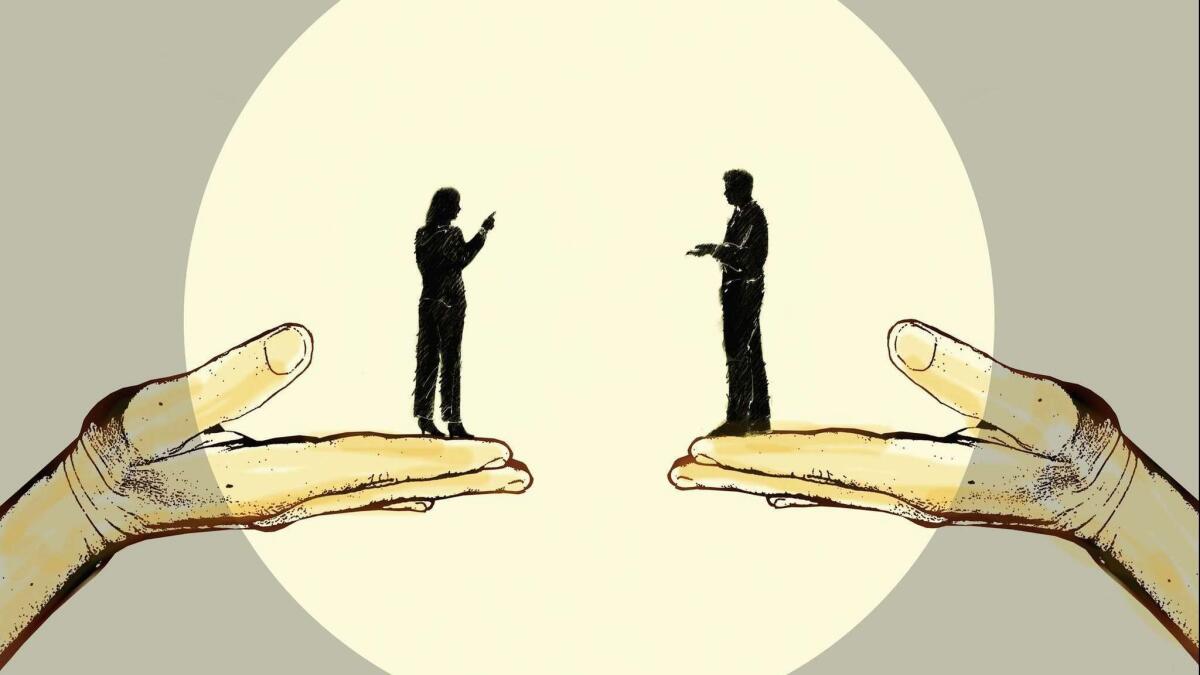Op-Ed: Neighborhood disputes turn into little wars all over the city. Give peace a chance — through mediation

- Share via
At a cocktail party I attended, a guy railed about how “stupid” it is that the Israelis and the Palestinians can’t seem to resolve their differences. This was actually his second subject of the evening — the first being his ugly, decade-long battle with his neighbor over the leaves his tree drops on his neighbor’s driveway.
It’s tempting to have a smug snicker over such disputes — the tiny little wars people have with those living around them. Irate neighbors rant about trash bins left outside after pickup or dog poop habitually left unscooped. Or it’s noise — from booming music, screaming children, or loud sex — or cooking odors or pot smoke seeping from one apartment into another. And, most ironically, in suburban areas where parking spaces are plentiful, there are vicious feuds over where — on a public street — residents and their guests should be leaving their cars.
The outrage people feel over these seemingly petty concerns can turn formerly cordial next-door neighbors into next-door enemy combatants. Some simply seethe with resentment, but others devote themselves to trying make their neighbor give up, give in, and, ideally, paint a confession on their garage door, admitting to: 1. Morally bankrupt trash bin handling; and 2. Being a totally garbage person. Either way, the result is often a vortex of bad will that can suck in those around them and can lead to court battles or even violence.
The outrage people feel over these seemingly petty concerns can turn formerly cordial next-door neighbors into next-door enemy combatants.
I recently volunteered to step into the middle of these kinds of messes — and no, not because I felt starved for namecalling. (Who these days doesn’t get their fill of that on Twitter?) I was drawn to the possibility of helping quarreling people change the channel on ugliness — transform their hostile conversations into meaningful ones.
There’s a formal way to do that, and it’s through mediation. This summer, I went through the Los Angeles city attorney’s training program for volunteer mediators. Though it is far too little-known, the city attorney’s office provides a free dispute resolution service, available to any resident of Los Angeles. It is offered not just for neighbors’ conflicts but for business, landlord-tenant, school, consumer and family disputes.
I write science-based self-help books and advice columns, so I’ve been telling quarreling couples how to mend their differences for more than 20 years. I’d assumed that in mediating disputes, I’d likewise act as a sort of Sister Socrates, deciding the fairest course of action and handing down an agreement for participants to live by.
But I quickly learned that this isn’t how mediation works. The participants come up with their own solutions (which likely makes them more invested in following them). The mediator acts as a facilitator — creating a psychological environment where the parties can communicate. As one of the mediation trainers put it: “We stand in the gap and translate — so party A understands party B.”
An essential element of this is how the mediator shifts the participants’ focus from “positions” to “interests.” Positions are specific wants; for example: “Stop parking your car so close to mine that only someone built like a paper cut could get in the driver’s side door.” Interests are the underlying motivations: “I want you to treat me with respect — act like my needs matter.”
I learned in my mediation training that relationships between warring parties can sometimes be mended without the inciting issue being fully resolved. For example, trees drop leaves, and a person can’t just scold his sycamore into depositing them on the right side of the property line. That person also may lack the physical ability or financial means to tidy up the neighbor’s driveway. Yet, there can often be reconciliation if, say, the tree guy agrees to take some small step that makes the driveway guy feel that he isn’t being disrespected. I experienced how satisfying that felt while simply playing the role of an injured party during my training. What an enormous relief it must be for someone who’s spent years feeling harmed.
Mediation training led me to rethink an assumption I suspect many of us make: that conflict is awful and damaging and should be avoided.
Conflict can be toxic if it leads us to lash out or to engage in passive-aggressive behaviors. But conflict also presents an opportunity — for insight and growth and building deeper, more harmonious relationships. Getting to that stage, however, requires framing issues in ways that make them potentially resolvable instead of immediately inflammatory.
Enter the Fray: First takes on the news of the minute from L.A. Times Opinion »
Though I have yet to start mediating disputes, I’ve already experienced benefits from using the techniques in my own life. A close friend revealed the politics of a well-known mutual friend of ours to others at a party. I was horrified. But instead of expressing that, I took him aside and said, “Hey, question for you: Do you think maybe our friend told you his views in confidence, figuring you’d keep them in confidence?”
Because I didn’t attack him, he didn’t have to defend himself. His response: “Yeah. You’re right. Shouldn’t have done that.”
It’s easy to slap a “Give peace a chance!” bumper sticker on your car. But this can be more than a slogan. We need to stop seeing peace talks only as a conduit for ceasefire agreements between armies in faraway places. Some can start when you take a break from muttering obscenities at the guy across the cul de sac and invite him to join you for a beer.
Amy Alkon is the author of the “science-help” book “Unf---ology: A Field Guide to Living with Guts and Confidence.”
Follow the Opinion section on Twitter @latimesopinion and Facebook
More to Read
A cure for the common opinion
Get thought-provoking perspectives with our weekly newsletter.
You may occasionally receive promotional content from the Los Angeles Times.









